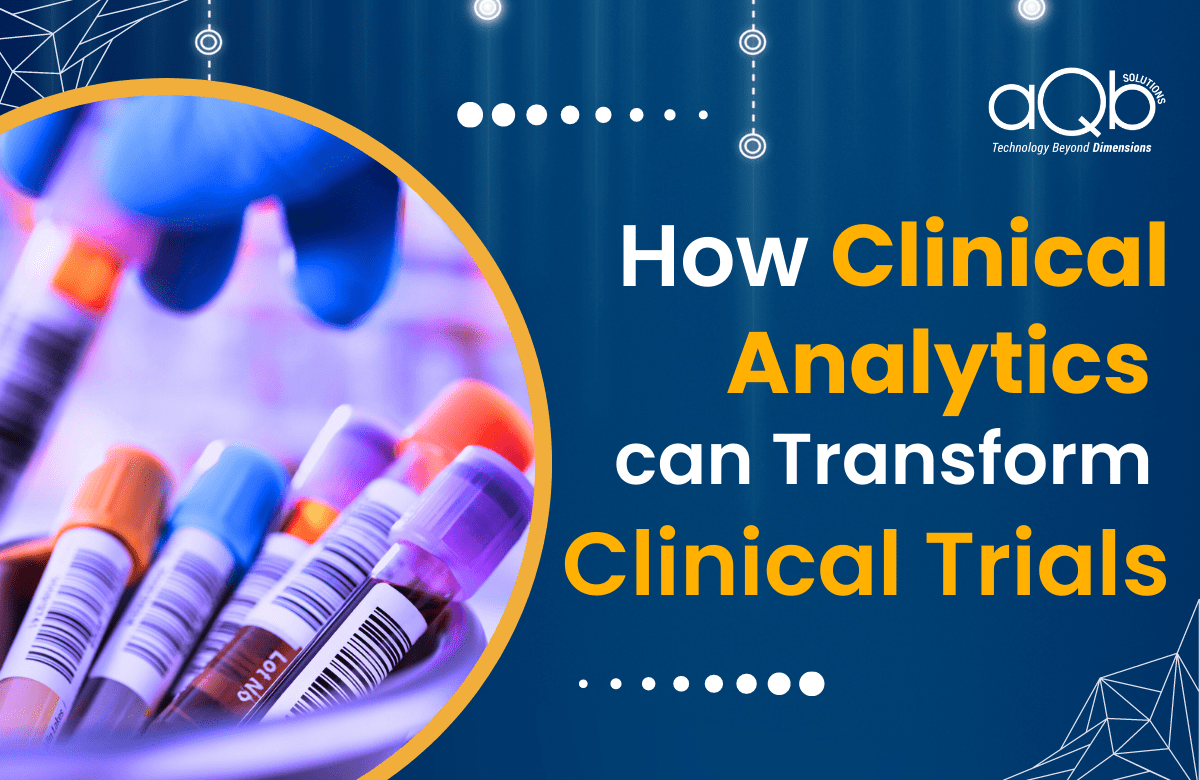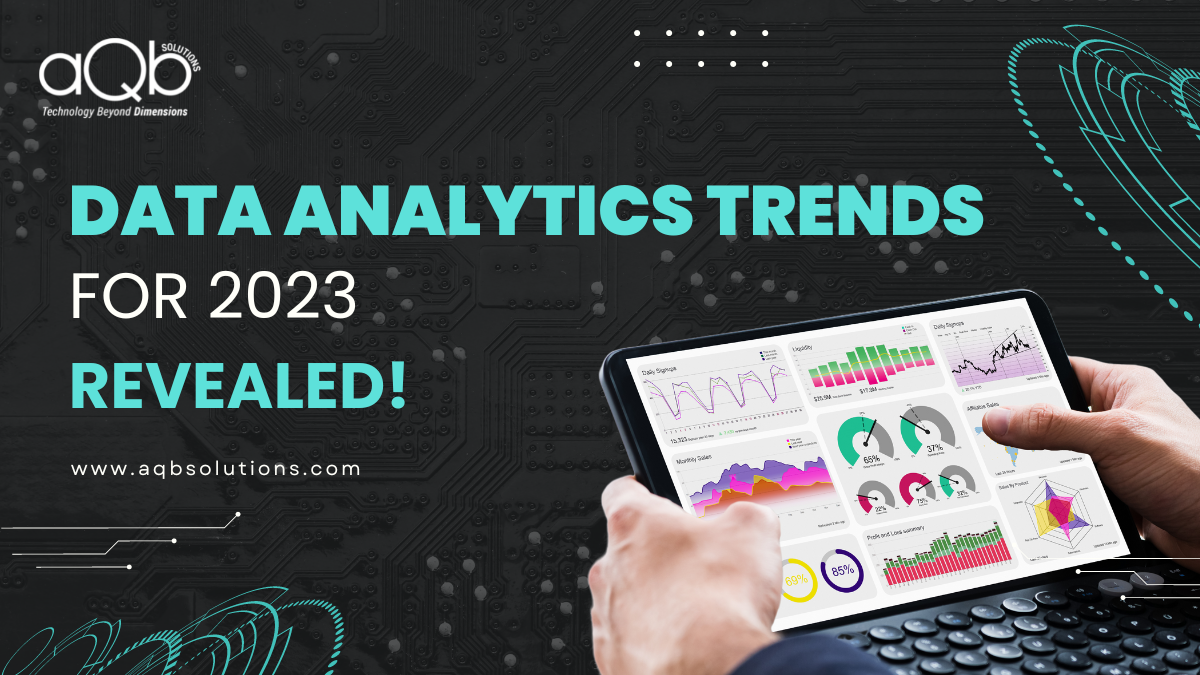Technology has transformed the way many industries work including life sciences. In the life sciences domain, companies are harnessing technology for conducting clinical trials, where it’s helping to generate high-quality data that’s free of inconsistencies, errors, misreported events, and outliers. The goal is speeding up the process of drug approval. But there’s a major hurdle here – clinical trial data is huge and complex, and it’s expanding exponentially!
Clinical analytics steps in as the solution here!
Clinical analytics plays a pivotal role in examining extensive datasets from clinical trials, determining the relevant information, and extracting valuable insights. Moreover, it enables the use of electronic patient hospital records combined with their previous medical records to identify suitable candidates for specific trials. This not only saves time but also enhances cost-effectiveness.
How Big Data Analytics Benefits Clinical Trials
Leveraging the latest technologies, big data analytics studies real-time data as well as derives insights from it. Using these insights, researchers can get accurate and improved results of the clinical trials.
With clinical analytics, healthcare professionals can detect and track the levels of drug exposure, the immunity a medicine offers, the treatment’s safety and tolerability, and other factors important for the safety of patients. Strategies driven by big data not only boost result accuracy but also speed up clinical trials.
Here are some ways clinical research trials can be improved with analytics:
Reducing research cost with analytics
Utilizing SaaS-based research analytics platforms can effectively trim down the expenses associated with clinical research. These platforms are integrated with advanced technologies such as artificial intelligence, which help with analysis. This results in streamlined research processes, including the efficient development of research trials. These platforms can even autonomously construct trial models using your data, significantly alleviating the workload on your researchers and subsequently leading to cost reduction. Such platforms are also used by healthcare organizations apart from clinical research organizations.
Forecasting the enrollment of patients for research programs
If you don’t get the required number of volunteers in your research programs, it can be troublesome for you. Through research analytics, it becomes possible to anticipate the potential count of volunteers for each trial beforehand. Moreover, you can compare enrollment models with simulations mimicking various situations involving volunteers in different numbers. This process enables you to identify any shortfall in meeting the necessary patient quota for each trial. This enhanced understanding helps you to design backup plans in case you get less than the required number of patients.
Including data from various sources
Clinical analytics enables the integration of information from diverse sources, like hospital EHR systems, imaging centers, pharmacies, and laboratories. This grants your researchers entry into an adaptable analytical setting, simplifying the examination of clinical data.
Adding value to clinical trials
By leveraging clinical research data analytics, you can drive substantial transformations within your clinical research methodology. These modifications not only result in cost reduction but also speed up the acquisition of insights. Furthermore, analytics significantly simplifies the process of sharing data with third parties for secondary research purposes.
Some other benefits of big data use in clinical trials are:
- Better patient analytics
- Improved sales and marketing
- Reduced drug pricing and improved promotion analytics
Use Cases of Clinical Analytics in Clinical Trials
Following are some use cases of clinical analytics in clinical trials:
Drug Efficacy and Safety Assessment: Pharma companies use analytics to assess the efficacy and safety of new drugs by analyzing clinical trial data. This includes identifying adverse events, evaluating dosage levels, and measuring treatment outcomes.
Real-time Monitoring: Clinical analytics is used by pharma companies for real-time monitoring of patient data to quickly identify safety concerns, protocol deviations, or efficacy signals, enabling timely intervention.
Market Access and Pricing: After successful trials, analytics can be used to assess the market potential of a new drug, determine pricing strategies, and inform market access decisions.
Adaptive Trial Design: Analytics enables adaptive trial designs where trial parameters can be adjusted based on interim data analysis. This flexibility can lead to more efficient trials and faster decision-making.
How real-time data analysis reforms clinical trials
Utilizing real-time data analysis enhances the results of clinical trials by effectively addressing various issues such as:
- Drug accountability
- Adherence to protocols
- Consent management
The Real-Time Clinical Data (RCD) can be used in daily patient care for analyzing the outcomes as well as avoiding expensive, unmanageable treatments and follow-ups.
Despite the procedure being in its early stages, the limitations of utilizing RCD, treatment viability, patent privacy concerns and various other complications are getting resolved already. While obstacles persist, ongoing efforts are progressively overcoming them. As time unfolds, innovative advancements are likely to enhance the efficiency of clinical trials, leading to a more streamlined future.
Implementing real-time data analysis reduces the chances of errors while also helping to eliminate human fallibilities. By harnessing the capabilities of data analysis and leveraging robust big data tools, healthcare IT services gain the capacity to predict issues, thereby facilitating remarkably swift problem-solving measures than ever.
The Future of Clinical Analytics
With the increasing prevalence of data analytics in the realm of clinical trials, we can anticipate a proliferation of even more remarkable advancements in the field of healthcare. Below are some ways clinical data analytics will further mold the landscape of clinical trials:
Better patient choice: Through data analytics, it becomes possible to pinpoint individuals who hold the highest potential for deriving benefits from specific treatments. This knowledge can subsequently be used to strategically focus on recruiting these patients into clinical trials.
Real-time data analysis: In the forthcoming times, data analytics will play a pivotal role in the real-time analysis of clinical trial data. This capability will empower sponsors to modify the trial’s structure on the go if any inefficacies are observed.
Increased Personalized Medicine: As data analytics continues to advance in its ability to recognize distinct patient subgroups that exhibit varying responses to treatments, the realization of personalized medicine will intensify. Tailored clinical trials will be crafted for each specific subgroup, leading to customized treatment approaches.
In Closing
The adoption of clinical analytics practices can bring many valuable benefits to the table. These include the reduction of administrative expenses, the improvement of care coordination, the enhancement of patient well-being, the provision of clinical decision support, and the mitigation of instances of abuse and fraud.
Now is the time for hospitals and clinical research organizations to embrace clinical analytics as it stands as a crucial factor for organizations to not only survive but also prosper amidst the evolving landscape of governmental regulations.



